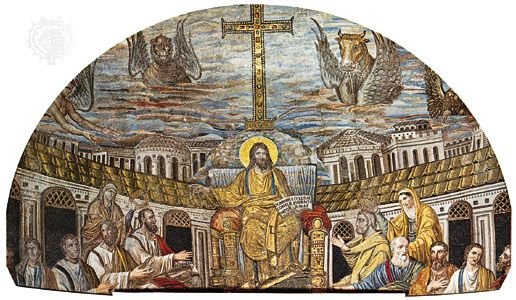Have you ever wondered what it would be like to have a personal conversation with God? To hear His voice, receive divine guidance, and experience His presence? In the Bible, some individuals had such extraordinary encounters. They were the chosen ones, the biblical figures spoken to directly by God, who received divine communication and God’s direct messages in scripture.
For centuries, their stories have captivated and inspired believers around the world. Their experiences shed light on the nature of divine communication, the power of God’s direct messages, and the profound impact these encounters had on their lives.
In this article, we will embark on a journey through the pages of the Bible, exploring the lives of those who had personal conversations with God. We will delve into the question who did god speak to personally in the bible and the stories of important figures in the Old Testament, the prophets who delivered divine messages, and notable encounters in the New Testament. We will also uncover insights from Jesus Christ himself, who had a unique relationship with God.
Join us as we uncover the mysteries of divine communication in the Bible and seek to understand the significance of these encounters. Let us be inspired, challenged, and transformed by the stories of those who heard the voice of God personally.
Key Takeaways:
- Several biblical figures had personal conversations with God.
- Divine communication in the Bible included direct messages and revelations.
- The Old Testament features important figures who heard God’s voice.
- The prophets served as intermediaries between God and the people.
- Notable encounters with God can be found in the New Testament.
Table of Contents
Important Figures in the Old Testament
In the Old Testament, we encounter several significant figures who had profound conversations with God and heard His voice. These individuals experienced divine revelations, which played a crucial role in shaping their lives and the course of biblical history.
Abraham
“I am God Almighty; walk before me faithfully and be blameless.” – Genesis 17:1
Abraham, known as the Father of Nations, had a close relationship with God. He received multiple divine messages and experienced personal encounters throughout his life, including the covenant with God and the promise of descendants as numerous as the stars.
Moses
“I AM WHO I AM… Thus you shall say to the Israelites, ‘I AM has sent me to you.'” – Exodus 3:14
Moses heard the voice of God from a burning bush when he was called to deliver the Israelites from slavery in Egypt. He later received the Ten Commandments and the divine instructions for building the tabernacle. Moses’ conversations with God were instrumental in leading the Israelites through the wilderness and establishing the foundation of the Mosaic Law.
Elijah
“What are you doing here, Elijah?” – 1 Kings 19:13
Elijah, a powerful prophet, encountered God on Mount Horeb. He experienced both the destructive power of God in the wind, earthquake, and fire, as well as the gentle whisper that represented God’s presence. Through these divine revelations, Elijah found strength and direction for his prophetic ministry.
Isaiah
“Whom shall I send? And who will go for us?” – Isaiah 6:8
Isaiah’s encounter with God in the temple provided him with a clear vision of God’s holiness and the commission to be a prophet. He heard God’s voice and received divine messages that foretold the birth of the Messiah and proclaimed hope for the future restoration of Israel.
| Biblical Figure | Conversations with God | Divine Revelations |
|---|---|---|
| Abraham | Covenant, Promise of descendants | Genesis 12-22 |
| Moses | Burning bush, Ten Commandments | Exodus 3-34 |
| Elijah | Mount Horeb encounter | 1 Kings 19 |
| Isaiah | Temple vision, Prophetic messages | Isaiah 6-66 |
The Prophets and Their Divine Messages

The prophets played a crucial role in the Bible as they were the intermediaries through whom God conveyed His messages to the people. These chosen individuals had direct conversations with God and delivered His divine messages.
Throughout the pages of the Bible, we encounter prophets who received profound revelations and guidance from the Almighty. They faithfully communicated God’s will, shared His warnings, and delivered messages of hope and restoration to the people.
“Thus says the Lord…” echoed through the voices of these prophets, as they fearlessly proclaimed God’s words to kings, priests, and the entire nation of Israel. Their messages carried divine authority and often called for repentance, justice, and obedience to God’s commandments.
Take, for example, the prophet Moses, who was called by God to lead the Israelites out of slavery in Egypt. Through God’s direct communication, Moses received the Ten Commandments, a foundation of moral and ethical principles that still guide humanity today.
In addition to Moses, other prophets like Isaiah, Jeremiah, and Ezekiel were given visions, dreams, and direct conversations with God. Their prophecies served as a roadmap, unveiling future events, offering comfort, and pointing to the coming Messiah.
“For I know the plans I have for you, declares the Lord…” spoke the prophet Jeremiah, reassuring the people of God’s faithfulness and His intentions to give them hope and a future.
These prophets were often met with adversity and persecution as they fearlessly spoke on behalf of God. However, their obedience and unwavering faith exemplified their divine calling.
The table below provides a glimpse into some of the prophets and the messages they received from God:
| Prophet | Divine Messages |
|---|---|
| Moses | Received the Ten Commandments and detailed instructions for the Tabernacle. |
| Isaiah | Foretold the birth of the Messiah and prophesied about the suffering servant. |
| Jeremiah | Warned of the imminent destruction of Jerusalem and the captivity of the Israelites, while also announcing a new covenant. |
| Ezekiel | Received visions of God’s glory, accurately predicted the fall of Jerusalem, and prophesied about the restoration of Israel. |
These prophets were instrumental in preserving and reinforcing God’s divine messages throughout history. Their words continue to inspire and guide believers in their faith journey, reminding us of God’s sovereignty and His desire for a relationship with His creation.
Notable Encounters in the New Testament
While God’s direct interactions became less frequent in the New Testament, there are still notable encounters with God documented in this period. Let’s explore these encounters and highlight the individuals who experienced divine communication.
“Truly, you are the Son of God.” – Matthew 14:33
“Rabbi, you are the Son of God; you are the King of Israel.” – John 1:49
“My Lord and my God!” – John 20:28
In the New Testament, we find instances of individuals who spoke directly with God and recognized the divine nature of Jesus. One notable encounter is the transfiguration, where Peter, James, and John witnessed the glorification of Jesus and heard the voice of God affirming His Son. These disciples, along with others in the New Testament, had a firsthand experience of divine communication.
Notable Figures in the New Testament
- Paul – In his journey to Damascus, Paul had a life-changing encounter with God where he was blinded and received a direct message.
- John the Baptist – Considered the last prophet before Jesus, John the Baptist had a special role in preparing the way for the Messiah and heard the voice of God at Jesus’ baptism.
- Mary – The mother of Jesus, Mary, received a visitation from the angel Gabriel, proclaiming God’s plan for her to give birth to the Son of God.
- Peter – As one of Jesus’ closest disciples, Peter had multiple encounters with divine communication, including his confession of Jesus as the Son of God.
These notable figures in the New Testament serve as examples of divine communication and the recognition of Jesus as the Son of God. Their encounters with God played significant roles in shaping their faith and spreading the message of Christianity.
| Biblical Figure | Encounter with God |
|---|---|
| Paul | Blinded by a bright light and heard the voice of Jesus |
| John the Baptist | Heard the voice of God at Jesus’ baptism |
| Mary | Visited by the angel Gabriel and received God’s message |
| Peter | Confessed Jesus as the Son of God |
Insights from Jesus Christ
Jesus Christ, the central figure of Christianity, had a profound and unique relationship with God. Throughout his ministry, there were several instances where Jesus directly communicated with God, providing invaluable insights into the divine relationship and the messages delivered.
One notable conversation with God occurred during Jesus’ baptism in the Jordan River. As Jesus emerged from the water, the heavens opened, and he heard the voice of God saying, “This is my beloved Son, with whom I am well pleased” (Matthew 3:17). This divine affirmation confirmed Jesus’ special role as the Son of God and further strengthened his relationship with the divine.
“Truly, truly, I say to you, the Son can do nothing of his own accord, but only what he sees the Father doing. For whatever the Father does, that the Son does likewise.” (John 5:19)
Throughout his ministry, Jesus emphasized his intimate connection with God, often referring to himself as the Son of God and demonstrating his obedience to the Father’s will. In the Garden of Gethsemane, Jesus fervently prayed, seeking guidance and strength from God before his crucifixion. Through this poignant moment of vulnerability and communion with God, Jesus displayed the depth of his relationship and dependency on divine guidance.
It is through Jesus’ conversations with God that we gain a deeper understanding of the divine relationship and the messages delivered. His teachings reflect the Father’s will, and his unwavering faith serves as a source of inspiration and guidance for believers.
| Conversation | Context | Insight |
|---|---|---|
| The Baptism | As Jesus was baptized in the Jordan River | Confirmation of Jesus as the beloved Son of God |
| Prayer at Gethsemane | Before his crucifixion | Jesus’ reliance on God’s guidance and strength |
Understanding Divine Revelations
Divine revelations hold immense significance when it comes to comprehending God’s will and purpose. Throughout the Old Testament, we witness numerous instances of God delivering direct messages to individuals, revealing His divine plans and guidance. These revelations served as a profound source of wisdom, offering deep insights into the nature of God and His desires for His people.
When studying the accounts of divine revelations in the Old Testament, we can observe how these messages shaped the lives and destinies of those who received them. From the profound visions of Isaiah to the personal encounters of Moses, these divine revelations left an indelible mark on the course of human history.
“And the Lord came down in a pillar of cloud and stood at the entrance of the tent and called Aaron and Miriam, and they both came forward.” – Numbers 12:5
One notable example is the encounter between God, Aaron, and Miriam documented in the book of Numbers. In this revelation, God reproved Miriam and Aaron for their criticism of Moses. By speaking directly to Aaron and Miriam, God conveyed His displeasure and reaffirmed Moses’ authority as His chosen leader.
Divine revelations in the Old Testament were not limited to warnings or rebukes. They also provided comforting reassurances and promises. For instance, God’s covenant with Abraham, where He promised to bless him abundantly and make his descendants as numerous as the stars, stands as a testament to the divine grace and faithfulness.
These divine messages were direct, unambiguous, and carried significant weight. They granted individuals a unique glimpse into the divine realm and enriched their understanding of God’s character and intentions. Through these revelations, God established a profound bond with His chosen people and guided them on their journey of faith.
The impact of divine revelations in the Old Testament continues to resonate today, offering us insights into the nature of God and His desire for humanity. They serve as a reminder of the ongoing relationship between God and His creation, highlighting the importance of listening for His divine voice and seeking His guidance.
| Old Testament Figure | Divine Revelation |
|---|---|
| Abraham | God’s covenant and promise of descendants |
| Moses | Receiving the Ten Commandments |
| Elijah | Hearing God in a still small voice |
| Samuel | God’s call to serve as a prophet |
| Jeremiah | Divine commission to deliver God’s messages |
The Impact and Meaning of God’s Personal Communication
In the Bible, numerous biblical figures were fortunate enough to have direct personal encounters with God. These encounters were profound and involved receiving messages directly from the Almighty. The impact of these divine communications cannot be underestimated, as they continue to shape and influence our faith today.
When God speaks to individuals in the Bible, it signifies His unique relationship with them and the importance of their role in fulfilling His divine plan. These encounters serve as powerful examples of God’s desire for personal connection and His purpose for each individual’s life. They demonstrate His willingness to communicate with humanity and guide them in their journey of faith.
Through these encounters, we gain valuable insights into God’s character, His desires for His people, and the lessons we can learn from the experiences of these biblical figures. We witness the transformative power of God’s direct communication, as it often prompts personal and spiritual growth, deepens faith, and instills a sense of purpose and direction.
As we reflect on the biblical figures spoken to by God and their experience of receiving a message from Him, we are reminded of the significance of divine communication in our own lives. Though we may not have the same level of direct interaction, we can seek to develop a personal relationship with God through prayer, Scripture, and communion with the Holy Spirit.
FAQ
who did god speak to personally in the bible?
Several notable individuals in the Bible had direct personal encounters and conversations with God. Some of these figures include Adam and Eve, Noah, Abraham, Moses, Samuel, Elijah, Isaiah, Jeremiah, Ezekiel, and others.
What do we know about divine communication in the Bible?
Divine communication in the Bible refers to the direct messages and revelations from God to certain individuals. These communications often conveyed divine instructions, guidance, warnings, or comforting messages. Through these encounters, God revealed His will and purpose to His chosen servants.
Which prophets spoke directly with God and delivered His messages?
Several prophets in the Bible had direct conversations with God and were entrusted with delivering His messages to the people. Some prominent examples include Moses, who received the Ten Commandments and communicated with God face-to-face, Elijah, Isaiah, Jeremiah, and Ezekiel, among others.
Are there any notable encounters with God in the New Testament?
While direct encounters with God became less frequent in the New Testament, there are still significant instances of divine communication. One notable example is Saul’s encounter with Jesus on the road to Damascus, which led to his conversion and transformation into the apostle Paul.
Did Jesus have direct communication with God?
Yes, Jesus Christ, the central figure of Christianity, had a unique and profound relationship with God. He often prayed and had direct conversations with God, providing insights into the nature of their divine relationship and delivering important teachings to His followers.
What is the significance of divine revelations in the Old Testament?
Divine revelations in the Old Testament played a crucial role in guiding the lives of the chosen individuals and shaping the course of human history. These revelations often provided insight into God’s plans, His moral and ethical expectations, and His promises to His people.
What is the impact and meaning of God’s personal communication in the Bible?
God’s personal communication in the Bible serves as a testament to His love, guidance, and involvement in the lives of His people. These encounters reveal His character, His desire for a relationship with humanity, and His intention to guide and direct His followers. They offer valuable lessons and inspire faith and obedience in believers today.

Rockin’ the faith, one verse at a time!
Growing up, the Bible’s stories deeply impacted me. Now, with over 15 years of preaching experience, I blend timeless teachings with modern technology, making them relevant for today’s world.
Bible Hub Verse is my platform to share historical insights and thought-provoking articles, exploring both familiar and uncommon Christian topics. My passion is building a welcoming online space for everyone to learn, grow in their faith, and discover the Bible’s enduring message.
Join the journey!
God bless you.














